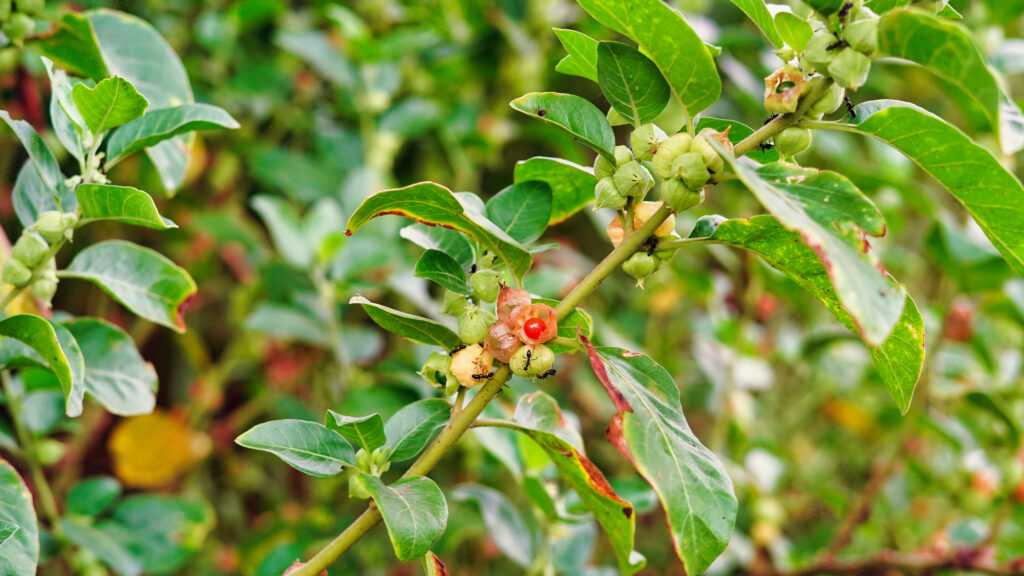We’re big fans of Ashwagandha here at Chuckling Goat, and once you know the health benefits, we think you will be too!
This all-around amazing herb has been shown to lower inflammation, help you get a good night’s sleep, support immune health, reduce anxiety and depression, lower blood glucose, and improve mental clarity – what more could you want?! Let’s check out the science…
What is Ashwagandha?
Ashwagandha (pronounced ash-wuh-gan-duh) is a traditional Ayurvedic herb derived from the shrub Withania somnifera. It’s also known as winter cherry and Indian ginseng.
Ashwagandha is defined as an adaptogenic herb which means it supports the body’s resilience to physiological and psychological demands. 1https://www.ncbi.nlm.nih.gov/pmc/articles/PMC6979308/

Nutrient content:
The plant, including its leaves and root, is full of health-giving compounds which can be extracted and used medicinally: alkaloids, flavonols, glycosides, withanolides, and sterols are just a few of them. As well as all these plant constituents, Ashwagandha is a good source of vitamin A, calcium, and iron.
How can Ashwagandha support your health?
Cognitive health: Ashwagandha increases the production of choline, an essential nutrient that may help with memory. 2https://www.ncbi.nlm.nih.gov/pmc/articles/PMC8632422/
Stress reduction: Ashwagandha balances cortisol levels so it can help reduce stress and anxiety. 3https://www.ncbi.nlm.nih.gov/pmc/articles/PMC6979308/ Compounds such as tri-ethylene glycol influence levels of GABA to calm brain activity. 4https://www.sleepfoundation.org/sleep-aids/ashwagandha
Sleep quality: Studies have shown that 300mg/1ml of Ashwagandha tincture (twice daily) is effective at relieving insomnia. 5https://pubmed.ncbi.nlm.nih.gov/31728244/ 6https://www.ncbi.nlm.nih.gov/pmc/articles/PMC6827862/
Immune health: Ashwagandha is ‘immunomodulatory’ (meaning it regulates the immune system). One way it does this is by improving the function of macrophages – immune cells that help fight off incoming germs. 7https://www.sciencedirect.com/science/article/abs/pii/S0254629922005099?via%3Dihub Plus, a compound called Withaferin A reduces inflammation and helps to balance the immune system. 8https://www.ncbi.nlm.nih.gov/pmc/articles/PMC7696210/
Thyroid health: Ashwagandha stimulates the thyroid gland to produce T4 and helps to regulate levels of T3 (the active thyroid hormone). 9https://pubmed.ncbi.nlm.nih.gov/28829155/ Stress and subsequent high cortisol levels have a negative impact on thyroid function so Ashwagandha’s cortisol-lowering effect helps to support overall thyroid health.
Joint health: Ashwagandha may act as a pain reliever, preventing pain signals from travelling along the central nervous system. It may also have some anti-inflammatory properties. For this reason, some research has shown it to be effective in treating forms of arthritis, including rheumatoid arthritis. 10https://www.ncbi.nlm.nih.gov/pmc/articles/PMC4405924/
Metabolic health: Ashwagandha has been shown to have a favourable effect on blood glucose and lipid levels as well as insulin function. 11https://pubmed.ncbi.nlm.nih.gov/31975514/ Withanolides specifically have been shown to increase the uptake of glucose into the cells, thereby reducing blood glucose levels. 12https://pubmed.ncbi.nlm.nih.gov/25796090/
Anti-aging: Certain compounds in Ashwagandha provide anti-aging mechanisms by protecting the genetic data in cells.
Anti-microbial action: Ashwagandha has been found to have antimicrobial inhibitory action against the following pathogens: 13https://www.researchgate.net/publication/279587332_Antimicrobial_activity_of_aqueous_and_methanolic_extracts_of_Withania_somnifera_Ashwagandha
- Escherichia coli
- Pseudomonas aeruginosa
- Staphylococcus aureus
- Streptococcus mutans
- Candida albicans
- Yersinia
How do you take it?
Ashwagandha comes in various forms – tincture, capsules, and powder.
We suggest taking 15-20 drops of tincture added to a small amount of water, two to three times per day. 1ml of tincture contains approximately 330mg of plant constituents.
Herbal tinctures are made using medical grade to extract the active ingredients from the root, concentrating them as a liquid. If you prefer to avoid the alcohol, you could try powdered ashwagandha instead – one tsp per day, mixed into oat, almond or goat’s milk.
Chuckling Goat Organic Ashwagandha tincture is a high-concentration, full-spectrum ashwagandha root tincture that is 100% organic and has been grown and produced here in the UK specifically for Chuckling Goat.
Who should be cautious about taking Ashwagandha?
Ashwagandha is a very safe supplement 14https://pubmed.ncbi.nlm.nih.gov/32201301/ however, please consult with your doctor if you are taking medication for the following conditions:
- Diabetes
- Thyroid conditions
- Blood pressure
- Immunosuppressants
- Sedatives
- Anti-depressants/SSRIs
This product contains pharmaceutical-grade alcohol so is not recommended for children, pregnant or breastfeeding women, or anyone who wishes to avoid alcohol. Ashwagandha may also increase testosterone levels.
Before taking new supplements, always check with your GP or consultant regarding interactions with medications and/or health conditions.
Want to know more? Check out this video.
Feel free to contact one of our Nutritional Therapists via live chat from 8 am to 8 pm on weekdays for bespoke advice on gut wellness.
References
- 1
- 2
- 3
- 4
- 5
- 6
- 7
- 8
- 9
- 10
- 11
- 12
- 13
- 14














